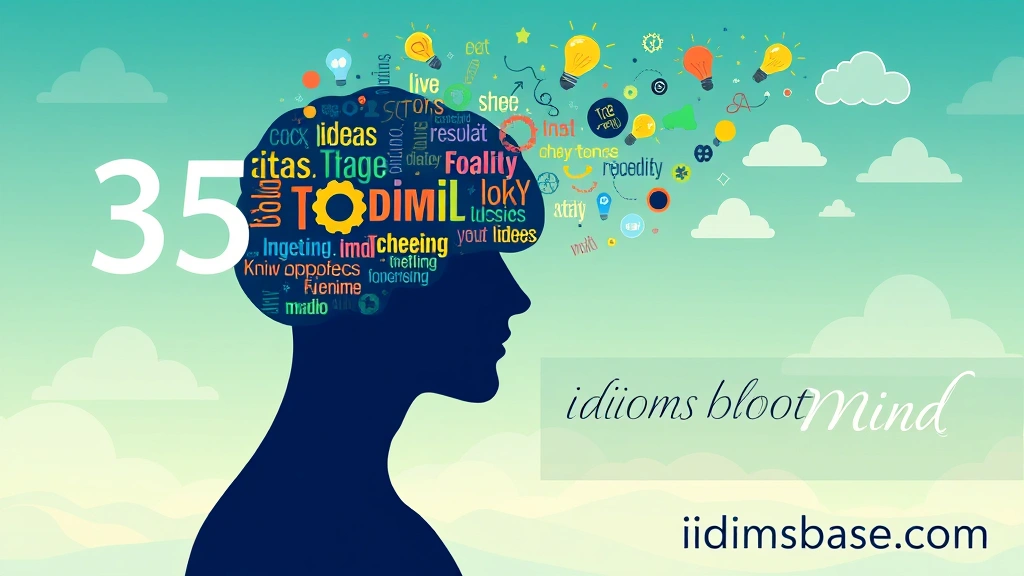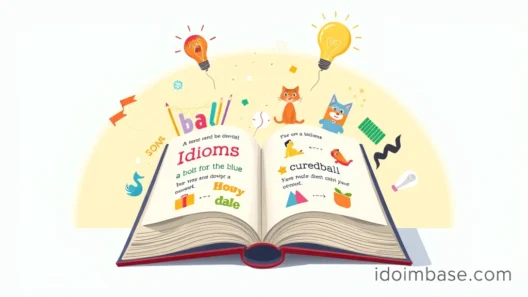Isn't it fascinating how our language reflects the very core of our being? When we talk about the "mind," we're not just discussing a physical organ; we're diving into thoughts, emotions, memories, and the very essence of who we are. It's no wonder that English, with its rich tapestry of expressions, has so many idioms dedicated to this incredible, invisible powerhouse!
You might find yourself wondering, "Why bother with idioms?" Well, dear reader, they're the secret sauce of fluent English. They add flavor, nuance, and a touch of native flair to your conversations. Plus, understanding them helps you grasp the unspoken meanings and cultural insights embedded in everyday speech. So, get ready to expand your mental vocabulary as we explore 35 incredible idioms about the mind!
35 Idioms About the Mind That Will Blow Yours!
Let's embark on this linguistic adventure and uncover the hidden gems that describe our amazing minds.
Idioms Describing Mental States and Processes
These idioms capture the various ways our minds work, from being sharp to being a bit scattered.
-
A mind of one's own: This one means you're independent in your thoughts and opinions, not easily swayed by others. You think for yourself!
- Example: "My daughter truly has a mind of her own; she always chooses her outfits, even if they don't match!"
-
Bear in mind: To remember something important, to keep it in your thoughts.
- Example: "Bear in mind that the deadline is next Friday, so plan accordingly."
-
Boggle the mind: Something so surprising, confusing, or overwhelming that it's hard to comprehend.
- Example: "The sheer complexity of the universe truly boggles the mind."
-
Blow one's mind: To be extremely impressed or astonished by something.
- Example: "That concert last night truly blew my mind; the visuals were incredible!"
-
Broad-minded: Open to new ideas, experiences, and different ways of thinking. You're not narrow or prejudiced.
- Example: "It's important to be broad-minded when traveling to new cultures."
-
Change one's mind: To alter a decision or opinion you previously held.
- Example: "I was going to order pizza, but I changed my mind and decided on pasta."
-
Come to mind: When something suddenly enters your thoughts or you remember it.
- Example: "When I think of summer, sunny beaches immediately come to mind."
-
Cross one's mind: To have a brief thought or idea, often unexpectedly.
- Example: "It never even crossed my mind that he would quit his job."
-
Ease one's mind: To relieve someone's worry or anxiety.
- Example: "Knowing the test results were negative really eased my mind."
-
Empty-minded: Lacking intelligence or serious thought; often used to describe someone frivolous.
- Example: "Some reality TV shows are so empty-minded, but sometimes that's exactly what you need to relax."
-
Flicker in one's mind: A brief, fleeting thought or image that appears and quickly disappears.
- Example: "A faint memory of that old house flickered in my mind."
-
Fresh in one's mind: Something that is still clearly remembered because it happened recently.
- Example: "The details of the meeting are still fresh in my mind."
-
Give someone a piece of one's mind: To tell someone exactly what you think, often in an angry or critical way.
- Example: "After he stood me up, I decided to give him a piece of my mind."

-
Go out of one's mind: To become crazy or irrational; to lose your sanity.
- Example: "I'll go out of my mind if I have to listen to that song one more time!"
-
Great minds think alike: A humorous or appreciative phrase used when two people have the same idea or thought simultaneously.
- Example: "You ordered the same dish? Great minds think alike!"
-
Have a good mind to: To feel strongly inclined to do something, often something slightly rebellious or assertive.
- Example: "I have a good mind to quit this job and start my own business."
-
Have a mind to: Similar to "have a good mind to," expressing an inclination or intention.
- Example: "I have a mind to take a long vacation after this project."
-
In one's right mind: To be sane and rational, not crazy or confused.
- Example: "No one in their right mind would drive during that blizzard."
-
Keep an open mind: To be willing to consider new ideas or opinions, even if they are different from your own.
- Example: "When trying new cuisines, it's best to keep an open mind."
-
Lack a mind: To be unintelligent or foolish.
- Example: "Sometimes, his comments make me wonder if he lacks a mind."
-
Lose one's mind: To become crazy or irrational (similar to "go out of one's mind").
- Example: "I'm going to lose my mind if this noise doesn't stop!"
-
Make up one's mind: To make a decision or come to a conclusion.
- Example: "Have you made up your mind about which college to attend?"
-
Mind over matter: The belief that your mental strength can overcome physical difficulties or challenges.
- Example: "When running a marathon, it's often mind over matter that gets you to the finish line."

-
Mind one's own business: To not interfere in other people's affairs.
- Example: "Just mind your own business and let them sort it out."
-
Mind your Ps and Qs: To be polite and well-behaved, paying attention to your manners.
- Example: "When you meet the Queen, make sure to mind your Ps and Qs."
-
Narrow-minded: Unwilling to consider new ideas or opinions; prejudiced.
- Example: "His narrow-minded views prevent him from understanding different cultures."
-
Never mind: Don't worry about it; forget what I just said.
- Example: "Oh, you don't have to clean that up. Never mind, I'll do it."
-
Out of one's mind: Crazy, irrational, or extremely foolish.
- Example: "You must be out of your mind to walk home alone at this hour."
-
Pick one's brain: To ask someone a lot of questions to get information or advice from their expertise.
- Example: "Could I pick your brain about your experience in the tech industry?"
-
Put one in mind of: To remind someone of something or someone else.
- Example: "That song really puts me in mind of my childhood."
-
Read one's mind: To know what someone else is thinking without them telling you.
- Example: "You brought me coffee? Wow, you read my mind!"
-
Set one's mind at ease: To make someone feel calm and less worried.
- Example: "The doctor's reassuring words set my mind at ease."
-
Speak one's mind: To say exactly what you think, often frankly and directly.
- Example: "She's not afraid to speak her mind, even if it's unpopular."

-
To one's mind: In one's opinion or belief.
- Example: "To my mind, that's the best way to solve the problem."
-
Worry one's mind: To cause someone to be anxious or troubled.
- Example: "The upcoming exams are really worrying my mind."
Frequently Asked Questions About Idioms and the Mind
You've got questions, and we've got answers! Let's clear up some common curiosities.
Q1: Why are idioms so important in English?
Idioms are the seasoning of language! They add color, express complex ideas concisely, and often reveal cultural nuances that direct translations miss. Understanding them helps you grasp the true meaning of conversations, media, and literature, making you sound more like a native speaker.
Q2: How can I remember so many idioms?
Great question! The best way is through consistent exposure and practice. Don't try to memorize them all at once. Instead:
- Context is King: Learn idioms within sentences and situations.
- Use Them: Try to incorporate one or two new idioms into your conversations or writing each week.
- Visual Aids: Create flashcards with illustrations or funny mental images.
- Listen Actively: Pay attention to how native speakers use them in movies, shows, and podcasts.
Q3: Are these idioms used in everyday conversation?
Absolutely! Many of the idioms listed here, like "bear in mind," "change one's mind," "make up one's mind," and "speak one's mind," are incredibly common in daily English. Others might be used less frequently but are still widely understood.
Q4: Do idioms about the mind exist in other languages?
Yes, every language has its own set of idioms, and many cultures have expressions related to the mind, thoughts, and emotions. While the exact wording will differ, the concept of using figurative language to describe internal states is universal. It's truly fascinating to see the parallels and differences!
Q5: Can using idioms make me sound more fluent?
Definitely! Using idioms naturally shows that you have a deeper understanding of the language beyond just literal translations. It demonstrates a level of fluency and cultural awareness that impresses native speakers and helps you connect on a more profound level. Just make sure you use them correctly – a misplaced idiom can sometimes lead to humorous misunderstandings!
Key Takeaways: Mastering Mind-Related Idioms
So, what have we learned from our journey through these fantastic idioms?
- Language is Dynamic: Our exploration shows how rich and expressive English is, especially when describing the intricate workings of the human mind.
- Context is Crucial: Understanding the situation in which an idiom is used is key to grasping its meaning. An idiom's power lies in its implied context.
- Practice Makes Perfect: Incorporating these idioms into your vocabulary takes time and consistent effort. Don't be afraid to try them out!
- Cultural Connection: Idioms are windows into culture. By learning them, you're not just learning words; you're gaining insight into the way English speakers think and express themselves.
- Enhance Your Fluency: Mastering idioms about the mind will undoubtedly elevate your English communication skills, making your conversations more colorful, precise, and engaging.
Isn't it amazing how a few well-chosen words can convey so much about our inner world? Your mind is a powerful tool, and now you have 35 more ways to talk about it! Which of these idioms resonated most with you? Do you have a favorite one you're excited to use? Share your thoughts and let's keep the conversation going!





